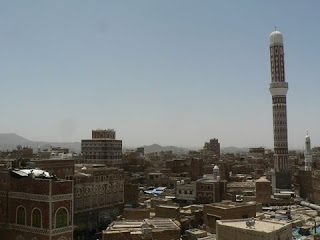Like Mexico almost all of the food is fried, and really a falafel is a rolled up taco. And naturally every meal has to be washed down with a soft drink to make sure that Type 2 diabetes really gets going !!! They even cook their meat the same way here - the large, round and shallow frying tops with an indentation in the middle to make sure no fat is lost - meat and fat bubbling away.
The skyline of down town Cairo, actually all of Cairo, is filled with a forest of bland concrete towers, and it looks like nothing has been built or maintained since 1968, despite the historic age of the city - everything is made of cement. (Except of course in the new, ritzy neighbourhoods where they use glass) From ground level you can see determine the age of the buildings, despite the thick covering of black soot, by how much the cement has crumbled.
Like Mexico, the city is over run by chaotic traffic, and it appears at first glance there are no road rules at all - other than the pedestrian as the smallest object must give way to everything, but somehow the traffic manages to sort itself out. The age of most cars and the thermal inversion means that everything, including your feet, ends up being covered in black soot and the air is filled with smog 24 hours a day - it makes for impressive sunsets but terrible respiratory health.
Both societies have the veneer of being deeply religious - churches and mosques everywhere, but people are more than willing to break all the rules, (have a mistress or two, have a few beers at a bar, run a drug cartel, pinch foreign women on the bum, blow up infidels) and still go to the church or mosque once a week in a public show of faith.
Both also have a certain affection for the kitsch, fluorescent colours, 1960's style polyester suits, moustaches, way to much make up, shiny black SUVs in urban areas - the list goes on and on























